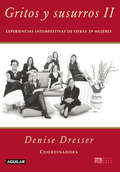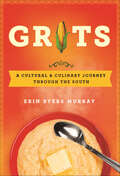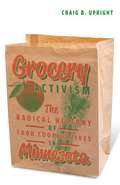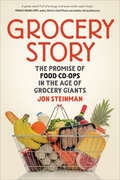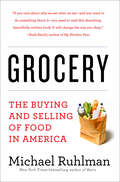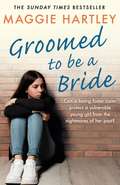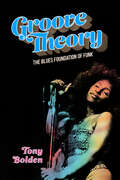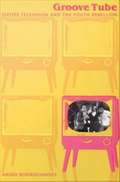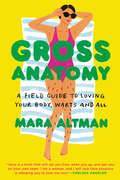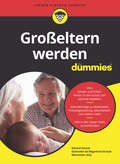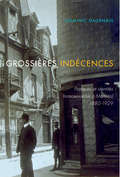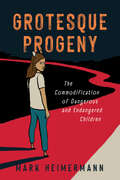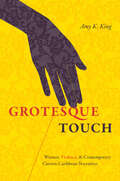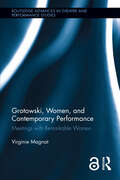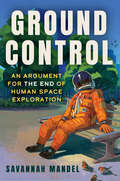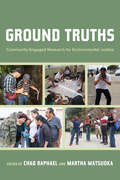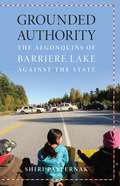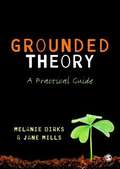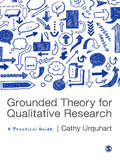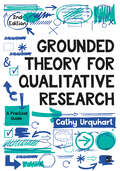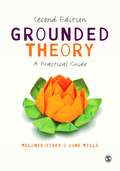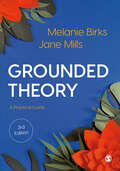- Table View
- List View
Gritos y susurros II: Experiencias intempestivas de otras 39 mujeres (Gritos y susurros #Volumen 2)
by Denise DresserUna colección de experiencias de mujeres famosas, compilada por Denise Dresser, una de las analistas más polémicas y críticas de la actualidad. Libro bestseller escrito por Denise Dresser, una de las analistas políticas más críticas y respetadas en México Una reunión de personajes femeninos que dejan al descubierto los pasajes más interesantes de su vida. El primer libro de Gritos y susurros generó entusiasmo y energía porque tejió una comunidad entre quienes lo leyeron, lo comentaron y lo recomendaron; su éxito demostró que las mujeres de México necesitan compartir sus historias, identificarse con ellas. Este libro continúa el ejercicio de libertad iniciado con el primer volumen y convoca nuevamente a un grupo diverso de mujeres -escritoras, actrices, artistas, políticas, funcionarias, empresarias, chefs, cantantes- a contar sus historias. Los textos son aleccionadores y emancipadores. Al leer a estas mujeres, se vuelve fácil reconocer que nos necesitamos las unas a las otras para compartir nuestras experiencias, elaborar nuevas formas de entendimiento, saber cómo somos y cuánto nos falta por hacer, para cargar una antorcha e iluminar el mundo como ellas lo hacen.
Grits: A Cultural & Culinary Journey Through the South
by Erin Byers MurrayGrits is a fascinating cultural history and examination of the current role of grits in Southern cuisine.For food writer Erin Byers Murray, grits had always been one of those basic, bland Southern table necessities—something to stick to your ribs or dollop the butter and salt onto. But after hearing a famous chef wax poetic about the terroir of grits, her whole view changed. Suddenly the boring side dish of her youth held importance, nuance, and flavor. She decided to do some digging to better understand the fascinating and evolving role of grits in Southern cuisine and culture as well as her own Southern identity. As more artisan grits producers gain attention in the food world, grits have become elevated and appreciated in new ways, nationally on both sides of the Mason Dixon Line, and by international master chefs. Murray takes the reader behind the scenes of grits cultivation, visiting local growers, millers, and cooks to better understand the South’s interest in and obsession with grits. What she discovers, though, is that beyond the culinary significance of grits, the simple staple leads her to complicated and persisting issues of race, gender, and politics.
Grocery Activism: The Radical History of Food Cooperatives in Minnesota
by Craig B. UprightA key period in the history of food cooperatives that continues to influence how we purchase organic food today Our notions of food co-ops generally don&’t include images of baseball bat–wielding activists in the aisles. But in May 1975, this was the scene as a Marxist group known as the Co-op Organization took over the People&’s Warehouse, a distribution center for more than a dozen small cooperative grocery stores in the Minneapolis area. The activist group&’s goal: to curtail the sale of organic food. The People&’s Warehouse quickly became one of the principal fronts in the political and social battle that Craig Upright explores in Grocery Activism. The story of the fraught relationship of new-wave cooperative grocery stores to the organic food industry, this book is an instructive case study in the history of activists intervening in capitalist markets to promote social change.Focusing on Minnesota, a state with both a long history of cooperative enterprise and the largest number of surviving independent cooperative stores, Grocery Activism looks back to the 1970s, when the mission of these organizations shifted from political activism to the promotion of natural and organic foods. Why, Upright asks, did two movements—promoting cooperative enterprise and sustainable agriculture—come together at this juncture? He analyzes the nexus of social movements and economic sociology, examining how new-wave cooperatives have pursued social change by imbuing products they sell with social values. Rather than trying to explain the success or failure of any individual cooperative, his work shows how members of this fraternity of organizations supported one another in their mutual quest to maintain fiscal solvency, promote better food-purchasing habits, support sustainable agricultural practices, and extol the virtues of cooperative organizing. A foundational chapter in the history of organic food, Grocery Activism clarifies the critical importance of this period in transforming the politics and economics of the grocery store in America.
Grocery Story: The Promise of Food Co-ops in the Age of Grocery Giants
by Jon SteinmanHungry for change? Put the power of food co-ops on your plate and grow your local food economy. Food has become ground-zero in our efforts to increase awareness of how our choices impact the world. Yet while we have begun to transform our communities and dinner plates, the most authoritative strand of the food web has received surprisingly little attention: the grocery store—the epicenter of our food-gathering ritual.Through penetrating analysis and inspiring stories and examples of American and Canadian food co-ops, Grocery Story makes a compelling case for the transformation of the grocery store aisles as the emerging frontier in the local and good food movements. Author Jon Steinman:Deconstructs the food retail sector and the shadows cast by corporate giantsMakes the case for food co-ops as an alternativeShows how co-ops spur the creation of local food-based economies and enhance low-income food access.Grocery Story is for everyone who eats. Whether you strive to eat more local and sustainable food, or are in support of community economic development, Grocery Story will leave you hungry to join the food co-op movement in your own community.
Grocery: The Buying and Selling of Food in America
by Michael RuhlmanThe New York Times–bestselling author “digs deep into the world of how we shop and how we eat. It’s a marvelous, smart, revealing work” (Susan Orlean, #1 bestselling author).In a culture obsessed with food—how it looks, what it tastes like, where it comes from, what is good for us—there are often more questions than answers. Ruhlman proposes that the best practices for consuming wisely could be hiding in plain sight—in the aisles of your local supermarket. Using the human story of the family-run Midwestern chain Heinen’s as an anchor to this journalistic narrative, he dives into the mysterious world of supermarkets and the ways in which we produce, consume, and distribute food. Grocery examines how rapidly supermarkets—and our food and culture—have changed since the days of your friendly neighborhood grocer. But rather than waxing nostalgic for the age of mom-and-pop shops, Ruhlman seeks to understand how our food needs have shifted since the mid-twentieth century, and how these needs mirror our cultural ones.A mix of reportage and rant, personal history and social commentary, Grocery is a landmark book from one of our most insightful food writers.“Anyone who has ever walked into a grocery store or who has ever cooked food from a grocery store or who has ever eaten food from a grocery store must read Grocery. It is food journalism at its best and I’m so freakin’ jealous I didn’t write it.” —Alton Brown, television personality“If you care about why we eat what we eat—and you want to do something about it—you need to read this absorbing, beautifully written book.” —Ruth Reichl, New York Times–bestselling author
Groomed to be a Bride
by Maggie HartleyA heartbreaking, powerful true story from Britain's most-loved foster carer, perfect for fans of Cathy Glass and Casey Watson.When a terrified young girl is discovered hiding in the back of a lorry, she is quickly taken into the care of social services. Arriving on the doorstep of foster carer Maggie Hartley, she is painfully thin, bruised and unable to speak a word of English. What atrocities has she escaped to bring her here? Woken each night by the screams of Halima's nightmares, Maggie is desperate to reach this damaged young girl. But without a shared language, she fears that she may never uncover the truth behind her terror.Can Maggie help Halima recover from the horrors she has endured, and help her build a new life for herself? Or will Halima forever be haunted by the ghosts of her past?
Groomed to be a Bride (A Maggie Hartley Foster Carer Story)
by Maggie HartleyA heartbreaking, powerful true story from Britain's most-loved foster carer, perfect for fans of Cathy Glass and Casey Watson.When a terrified young girl is discovered hiding in the back of a lorry, she is quickly taken into the care of social services. Arriving on the doorstep of foster carer Maggie Hartley, she is painfully thin, bruised and unable to speak a word of English. What atrocities has she escaped to bring her here? Woken each night by the screams of Halima's nightmares, Maggie is desperate to reach this damaged young girl. But without a shared language, she fears that she may never uncover the truth behind her terror.Can Maggie help Halima recover from the horrors she has endured, and help her build a new life for herself? Or will Halima forever be haunted by the ghosts of her past?
Groove Theory: The Blues Foundation of Funk (American Made Music Series)
by Tony BoldenTony Bolden presents an innovative history of funk music focused on the performers, regarding them as intellectuals who fashioned a new aesthetic. Utilizing musicology, literary studies, performance studies, and African American intellectual history, Bolden explores what it means for music, or any cultural artifact, to be funky. Multitudes of African American musicians and dancers created aesthetic frameworks with artistic principles and cultural politics that proved transformative. Bolden approaches the study of funk and black musicians by examining aesthetics, poetics, cultural history, and intellectual history. The study traces the concept of funk from early blues culture to a metamorphosis into a full-fledged artistic framework and a named musical genre in the 1970s, and thereby Bolden presents an alternative reading of the blues tradition. In part one of this two-part book, Bolden undertakes a theoretical examination of the development of funk and the historical conditions in which black artists reimagined their music. In part two, he provides historical and biographical studies of key funk artists, all of whom transfigured elements of blues tradition into new styles and visions. Funk artists, like their blues relatives, tended to contest and contextualize racialized notions of blackness, sexualized notions of gender, and bourgeois notions of artistic value. Funk artists displayed contempt for the status quo and conveyed alternative stylistic concepts and social perspectives through multimedia expression. Bolden argues that on this road to cultural recognition, funk accentuated many of the qualities of black expression that had been stigmatized throughout much of American history.
Groove Tube: Sixties Television and the Youth Rebellion
by Aniko BodroghkozyCritics often claim that prime-time television seemed immune--or even willfully blind--to the landmark upheavals rocking American society during the 1960s. Groove Tube is Aniko Bodroghkozy's rebuttal of this claim. Filled with entertaining and enlightening discussions of popular shows of the time--such as The Monkees, The Smothers Brothers Comedy Hour, The Mod Squad--this book challenges the assumption that TV programming failed to consider or engage with the decade's youth-lead societal changes. Bodroghkozy argues that, in order to woo an increasingly lucrative baby boomer audience, television had to appeal to the social and political values of a generation of young people who were enmeshed in the hippie counterculture, the antiwar movement, campus protests, urban guerilla action--in general, a culture of rebellion. She takes a close look at the compromises and negotiations that were involved in determining TV content, as well as the ideological difficulties producers and networks faced in attempting to appeal to a youthful cohort so disaffected from dominant institutions. While programs that featured narratives about hippies, draft resisters, or revolutionaries are examined under this lens, Groove Tube doesn't stop there: it also examines how the nation's rebellious youth responded to these representations. Bodroghkozy explains how, as members of the first "TV generation," some made sense of their societal disaffection in part through their childhood experience with this powerful new medium. Groove Tube will interest sociologists, American historians, students and scholars of television and media studies, and others who want to know more about the 1960s.
Gross Anatomy: Dispatches from the Front (and Back)
by Mara AltmanAn honest, funny, neurotic, and totally gross love child of Mindy Kaling and Mary Roach.Mara Altman's volatile and apprehensive relationship with her body has led her to wonder about a lot of stuff over the years. Like, who decided that women shouldn't have body hair? And how sweaty is too sweaty? Also, why is breast cleavage sexy but camel toe revolting? Isn't it all just cleavage? These questions and others like them have led to the comforting and sometimes smelly revelations that constitute Gross Anatomy, an essay collection about what it's like to operate the bags of meat we call our bodies. Divided into two sections, "The Top Half" and "The Bottom Half," with cartoons scattered throughout, Altman's book takes the reader on a wild and relatable journey from head to toe--as she attempts to strike up a peace accord with our grody bits. With a combination of personal anecdotes and fascinating research, Gross Anatomy holds up a magnifying glass to our beliefs, practices, biases, and body parts and shows us the naked truth: that there is greatness in our grossness.
Grosseltern werden für Dummies (Für Dummies)
by Gerard StroukEgal ob lange ersehnt oder völlig unerwartet ? wenn Ihr Kind ein Kind bekommt, finden Sie sich plötzlich in einer völlig neuen Rolle wieder: Sie werden Großeltern und eine spannende Zeit liegt vor Ihnen! Doch die Erziehung Ihrer eigenen Kinder ist schon lange her und Sie wissen gar nicht mehr so richtig, wie Sie mit Babys und Kleinkindern umgehen sollen? Keine Sorge, dieses Buch zeigt Ihnen, wie Sie Ihre Familie unterstützen können, ohne selbst dabei zu kurz zu kommen und wie Sie von Anfang an eine wunderbare Beziehung zu Ihrem Enkel aufbauen. Natürlich erfahren Sie auch, wie Sie mit Krankheitsfällen umgehen, wie Sie ein Nachmittag organisieren können und vieles mehr.
Grossières indécences: Pratiques et identités homosexuelles à Montréal, 1880-1929 (Studies on the History of Quebec/Études d'histoire du Québec)
by Domenic DagenaisAprès avoir cofondé la première revue homosexuelle canadienne, la poète Elsa Gidlow, 21 ans, décide de quitter Montréal en 1920, déçue par le manque de possibilités amoureuses que lui offre alors la ville. Le réseau d'amis masculins homosexuels qu'elle a intégré au cours des années précédentes ne manque toutefois pas d'occasions de trouver des partenaires. En effet, même si l'homosexualité est considérée comme un crime depuis l'époque coloniale, une culture gaie masculine, qui était pratiquement inexistante avant 1880, s'est largement épanouie depuis le début du siècle. Grossières indécences retrace les origines de cette culture clandestine complexe et fascinante. Dominic Dagenais a consulté à rebours des archives produites en grande partie par la surveillance et la persécution, soit des dossiers judiciaires, des articles de journaux, de la correspondance, des archives personnelles, des publications médicales et des dossiers d'enquêtes publiques pour mettre au jour le contexte répressif dans lequel les identités homosexuelles contemporaines se sont construites et pour découvrir les espaces publics investis par le monde homosexuel montréalais au tournant du XXe siècle. Dans une ville marquée par le fleurissement des loisirs commerciaux et les trépidations de son quartier chaud, des hommes, mais aussi quelques femmes, ont déployé diverses stratégies pour se rencontrer et pour nouer des relations. Des rencontres risquées surviennent ainsi dans les rues, ruelles, magasins, parcs, théâtres et toilettes publiques de la ville. Un monde homosexuel riche et diversifié prend forme à Montréal au tournant du XXe siècle, en dépit d'une surveillance policière de plus en plus élaborée et des lourdes sanctions pénales auxquelles s'exposent les individus se livrant à des rapports homosexuels, considérés alors comme une grossière indécence et comme le pire des vices. Ce livre documente son histoire inédite.
Grotesque Progeny: The Commodification of Dangerous and Endangered Children (Cultures of Childhood)
by Mark HeimermannIn contemporary Western society, childhood appears more protected than ever to the casual onlooker. Yet, we are increasingly fascinated by narratives in which children are depicted as unsettling beings, both dangerous and endangered, sometimes chaotic or even evil. In Grotesque Progeny: The Commodification of Dangerous and Endangered Children, author Mark Heimermann argues that these representations reflect cultural anxiety regarding a shifting conception of youths from emotional assets to economic ones. In the early to mid-twentieth century, children, who had previously been viewed in part as economic investments, were largely moved out of the work force. For decades, children were instead valued primarily as emotional assets. However, the rise of neoliberal capitalism in the 1970s and 1980s, and its eventual proliferation throughout our politics and our lives, has led to the widespread commodification of social arenas previously kept separate from the capitalist quest for profit. Not even children have escaped being objectified and dehumanized in this manner. Heimermann examines a variety of texts that center on children and adolescents who are marked as different from the adult characters and consequently viewed as grotesque. Chapters cover Jeff Lemire’s Sweet Tooth, M. R. Carey’s The Girl with All the Gifts, Katherine Dunn’s Geek Love, Richard Starkings’s Elephantmen, Kazuo Ishiguro’s Never Let Me Go, and more. Because the young characters are not viewed as equal members of society, they must either strike back at those who commodify them or risk facing a lifetime of dehumanization. Grotesque Progeny argues that these monstrous depictions reveal societal unease over shortsighted economic and political thinking, the exploitation of children, and the changing nature of childhood. The book addresses a growing concern over which spaces ought to be excluded or removed from the harsh valuations of neoliberalism.
Grotesque Touch: Women, Violence, and Contemporary Circum-Caribbean Narratives
by Amy KingIn this book, Amy K. King examines how violence between women in contemporary Caribbean and American texts is rooted in plantation slavery. Analyzing films, television shows, novels, short stories, poems, book covers, and paintings, King shows how contemporary media reuse salacious and stereotypical depictions of relationships between women living within the plantation system to confront its legacy in the present. The vestiges of these relationships--enslavers and enslaved women, employers and domestic servants, lovers and rivals--negate characters' efforts to imagine non-abusive approaches to power and agency. King's work goes beyond any other study to date to examine the intersections of gender, sexuality, race, ethnicity, class, ability, and nationality in U.S. and Caribbean depictions of violence between women in the wake of slavery.
Grotowski, Women, and Contemporary Performance: Meetings with Remarkable Women (Routledge Advances in Theatre & Performance Studies)
by Virginie MagnatAs the first examination of women's foremost contributions to Jerzy Grotowski's cross-cultural investigation of performance, this book complements and broadens existing literature by offering a more diverse and inclusive re-assessment of Grotowski's legacy, thereby probing its significance for contemporary performance practice and research. Although the particularly strenuous physical training emblematic of Grotowski's approach is not gender specific, it has historically been associated with a masculine conception of the performer incarnated by Ryszard Cieslak in The Constant Prince, thus overlooking the work of Rena Mirecka, Maja Komorowska, and Elizabeth Albahaca, to name only the leading women performers identified with the period of theatre productions. This book therefore redresses this imbalance by focusing on key women from different cultures and generations who share a direct connection to Grotowski's legacy while clearly asserting their artistic independence. These women actively participated in all phases of the Polish director’s practical research, and continue to play a vital role in today's transnational community of artists whose work reflects Grotowski's enduring influence. Grounding her inquiry in her embodied research and on-going collaboration with these artists, Magnat explores the interrelation of creativity, embodiment, agency, and spirituality within their performing and teaching. Building on current debates in performance studies, experimental ethnography, Indigenous research, global gender studies, and ecocriticism, the author maps out interconnections between these women's distinct artistic practices across the boundaries that once delineated Grotowski's theatrical and post-theatrical experiments.
Ground Control: An Argument for the End of Human Space Exploration
by Savannah MandelIn the 1960s and '70s, America spent $24 billion (around $150 billion in today's dollars) to land humans on the moon and "win" the space race. And while humans took their first steps on an extraterrestrial landscape, protesters at Cape Canaveral asked: Why waste money on space when there are so many issues here on Earth? More than 50 years later, an oligopoly of commercial space companies—SpaceX, Blue Origin, and Virgin Galactic—has begun sending civilians into space. These civilians are the first generation of what will undoubtedly be an extensive family of space tourists. Commercial space companies aim to expand access to space, find new sources of energy, mine outer space resources, and conquer extraterrestrial lands. But their goals remain that of a capitalist and imperialist class, intent on new frontier profiteering. Savannah Mandel uses cultural anthropology to trace the trajectory of the space industry as it faces the social, political, and economic repercussions of commercial space ventures head-on. In doing so, Mandel holds the space industry accountable for its actions by asking the same questions that some thought leaders asked in the 1960s:Should we go? Is it worth it to send humans to space? What cultural outcomes will result from continued human space exploration and the colonization of other worlds? And last, what can we learn about our present selves by studying our most extreme visions of the future
Ground Truths: Community-Engaged Research for Environmental Justice
by Chad Raphael and Martha MatsuokaA free ebook version of this title is available through Luminos, University of California Press’s Open Access publishing program. Visit www.luminosoa.org to learn more. This is the first book devoted entirely to summarizing the body of community-engaged research on environmental justice, how we can conduct more of it, and how we can do it better. It shows how community-engaged research makes unique contributions to environmental justice for Black, Indigenous, people of color, and low-income communities by centering local knowledge, building truth from the ground up, producing actionable data that can influence decisions, and transforming researchers’ relationships to communities for equity and mutual benefit. The book offers a critical synthesis of relevant research in many fields, outlines the main steps in conducting community-engaged research, evaluates the major research methods used, suggests new directions, and addresses overcoming institutional barriers to scholarship in academia. The coauthors employ an original framework that shows how community-engaged research and environmental justice align, which links research on the many topics treated in the chapters—from public health, urban planning, and conservation to law and policy, community economic development, and food justice and sovereignty.
Grounded Authority: The Algonquins of Barriere Lake against the State (Indigenous Americas)
by Shiri PasternakWestern Political Science Association's Clay Morgan Award for Best Book in Environmental Political Theory Canadian Studies Network Prize for the Best Book in Canadian Studies Nominated for Best First Book Award at NAISA Honorable Mention: Association for Political and Legal Anthropology Book Prize Since Justin Trudeau&’s election in 2015, Canada has been hailed internationally as embarking on a truly progressive, post-postcolonial era—including an improved relationship between the state and its Indigenous peoples. Shiri Pasternak corrects this misconception, showing that colonialism is very much alive in Canada. From the perspective of Indigenous law and jurisdiction, she tells the story of the Algonquins of Barriere Lake, in western Quebec, and their tireless resistance to federal land claims policy. Grounded Authority chronicles the band&’s ongoing attempts to restore full governance over its lands and natural resources through an agreement signed by settler governments almost three decades ago—an agreement the state refuses to fully implement. Pasternak argues that the state&’s aversion to recognizing Algonquin jurisdiction stems from its goal of perfecting its sovereignty by replacing the inherent jurisdiction of Indigenous peoples with its own, delegated authority. From police brutality and fabricated sexual abuse cases to an intervention into and overthrow of a customary government, Pasternak provides a compelling, richly detailed account of rarely documented coercive mechanisms employed to force Indigenous communities into compliance with federal policy.A rigorous account of the incredible struggle fought by the Algonquins to maintain responsibility over their territory, Grounded Authority provides a powerful alternative model to one nation&’s land claims policy and a vital contribution to current debates in the study of colonialism and Indigenous peoples in North America and globally.
Grounded Theory
by Melanie Birks Jane MillsNominated for The Qualitative Book Award for 2013 Watch Melanie Birks' interview on grounded theory This is a highly practical book which introduces the whole range of grounded theory approaches. Unlike most existing books in this area, which are written from a particular philosophical standpoint, this text provides a comprehensive description of the strategies and techniques employed in this methodology. Birks and Mills accessible and highly-readable text is driven by practical case examples throughout to help the reader get to grips with the process of doing grounded theory analysis for themselves. The book deploys a variety of educational activities to guide readers through both the principles and the application of grounded theory, making this an ideal starter text for those new to the approach. This is an ideal first introduction to grounded theory for any student or researcher looking to use grounded theory approaches in their analysis for the first time.
Grounded Theory for Qualitative Research: A Practical Guide
by Cathy UrquhartBased on the author's own wealth of experience this timely, engaging book helps first-time researchers to discover the excitement of grounded theory. Fresh, innovative and clear this book traces the history and development of grounded theory method, and examines how the method is evolving for new contexts today. It sets out the principles involved in using grounded theory and explains the process and theory associated with coding in grounded theory. The book introduces us to the practicalities of research design, theory building, coding and writing up and gives us the tools to tackle key questions: - What is grounded theory? - How do we code and theorise using grounded theory? - How do we write up a grounded theory study? This is an exciting new text for students and researchers across the social sciences who want to use grounded theory.
Grounded Theory for Qualitative Research: A Practical Guide
by Cathy UrquhartStraightforward and accessible, this pragmatic guide takes you step-by-step through doing grounded theory research. With hands-on advice focussed around designing real projects, it demonstrates best practice for integrating theory building and methods. Its extensive examples and case studies are drawn from across the social sciences, presenting students with a range of options for both applying and using grounded theory. Clear and easy to follow, this second edition: Traces the evolution of grounded theory method and provides a clear introduction to the nuanced history of grounded theory Showcases important concepts like theory building, helping you to reflect on the wider context of your research and the contribution it makes to existing literature Offers practical advice for how to do grounded theory research, alleviating common student concerns every step of the way This new edition features two new chapters: one covering theory, and one on Theoretical Sampling. Several chapters have also undergone updates: Chapter 5 includes a wider range of perspectives including feminist and post-colonial perspectives, Chapter 9 features new, contemporary examples on how to write up your study, and Chapters 2 and 10 include new developments in the field of Grounded Theory. Supported by videos from the author sharing expert advice, this book helps you build the confidence to explore and successfully complete your own grounded theory research.
Grounded Theory for Qualitative Research: A Practical Guide
by Cathy UrquhartStraightforward and accessible, this pragmatic guide takes you step-by-step through doing grounded theory research. With hands-on advice focussed around designing real projects, it demonstrates best practice for integrating theory building and methods. Its extensive examples and case studies are drawn from across the social sciences, presenting students with a range of options for both applying and using grounded theory. Clear and easy to follow, this second edition: Traces the evolution of grounded theory method and provides a clear introduction to the nuanced history of grounded theory Showcases important concepts like theory building, helping you to reflect on the wider context of your research and the contribution it makes to existing literature Offers practical advice for how to do grounded theory research, alleviating common student concerns every step of the way This new edition features two new chapters: one covering theory, and one on Theoretical Sampling. Several chapters have also undergone updates: Chapter 5 includes a wider range of perspectives including feminist and post-colonial perspectives, Chapter 9 features new, contemporary examples on how to write up your study, and Chapters 2 and 10 include new developments in the field of Grounded Theory. Supported by videos from the author sharing expert advice, this book helps you build the confidence to explore and successfully complete your own grounded theory research.
Grounded Theory: A Practical Guide
by Melanie Birks Jane MillsThis highly practical book introduces the whole range of grounded theory approaches, providing a comprehensive description of the strategies and techniques employed in this methodology. Unlike most existing books in this area, it is not written from a particular philosophical standpoint, and is the ideal first introduction for any student or researcher looking to use grounded theory in their analysis for the first time. Birks and Mills’ accessible and highly-readable text is driven by practical case examples throughout to help the reader get to grips with the process of doing grounded theory analysis for themselves. The book deploys a variety of educational activities to guide readers through both the principles and the application of grounded theory, making this an ideal starter text for those new to the approach. This updated Second Edition: guides the reader through each step of the grounded theory process clearly explains how to memo effectively, using examples includes a chapter which explains the difference between data generation and collection features information on how to use digital resources to manage data discusses the philosophy and ethics of grounded theory within the qualitative paradigm. Available with Perusall—an eBook that makes it easier to prepare for class Perusall is an award-winning eBook platform featuring social annotation tools that allow students and instructors to collaboratively mark up and discuss their SAGE textbook. Backed by research and supported by technological innovations developed at Harvard University, this process of learning through collaborative annotation keeps your students engaged and makes teaching easier and more effective. Learn more.
Grounded Theory: A Practical Guide
by Melanie Birks Jane MillsThis highly practical book introduces the whole range of grounded theory approaches, providing a comprehensive description of the strategies and techniques employed in this methodology. Unlike most existing books in this area, it is not written from a particular philosophical standpoint, and is the ideal first introduction for any student or researcher looking to use grounded theory in their analysis for the first time. Birks and Mills' accessible and highly-readable text is driven by practical case examples throughout to help the reader get to grips with the process of doing grounded theory analysis for themselves. The book deploys a variety of educational activities to guide readers through both the principles and the application of grounded theory, making this an ideal starter text for those new to the approach. This updated second edition: guides the reader through each step of the grounded theory process clearly explains how to memo effectively, using examples includes a chapter which explains the difference between data generation and collection features information on how to use digital resources to manage data discusses the philosophy and ethics of grounded theory within the qualitative paradigm.
Grounded Theory: A Practical Guide
by Melanie Birks Jane MillsThe student-focused guide to grounded theory, this book takes you step by step through the whole research process, from creating a research proposal to sharing your findings. Packed with tools to help you understand how grounded theory can be applied at each stage of your research project, the book includes: •Interactive activities and critical thinking questions in every chapter so you can put your knowledge into practice •Case studies written by a wide variety of researchers so you can learn how to navigate real world research from people who have been in your shoes •Templates and checklists to help guide your writing and ensure you don’t miss a step in the research process. Clear, accessible and applied, this book will help you get to grips with the philosophy of grounded theory, understand the nuts and bolts of designing and carrying out your research project, and manage any hurdles along the way. Explore the accompanying online resources, which include PowerPoint slides, additional templates, and weblinks to videos and journal articles relevant to the key concepts in each chapter.
